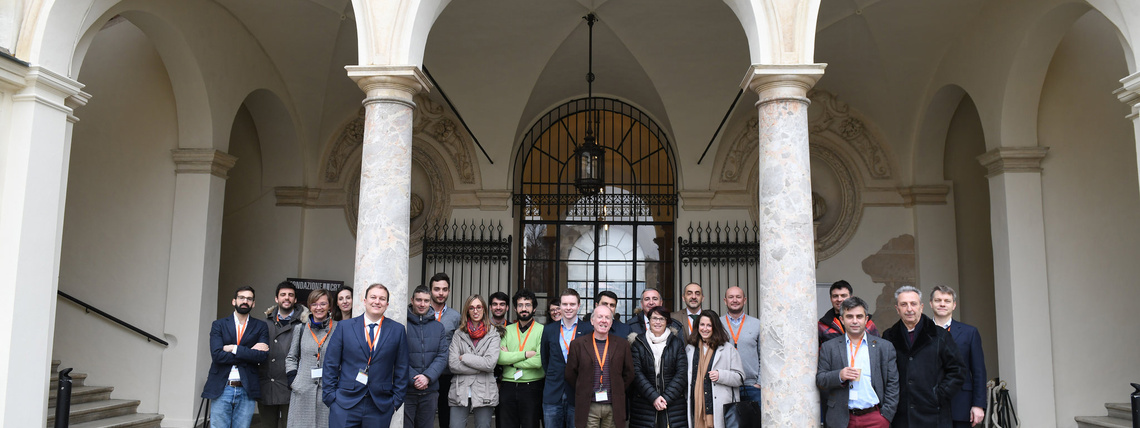The articles of the current edition are available on the new site.

REMOTE - Remote areas Energy supply with Multiple Options for integrated hydrogen-based TEchnologies – was awarded as the best renewable energy project within the European Sustainable Energy Week (EUSEW) 2020 Awards’ competition in the Innovation category.
The REMOTE project, funded by the Horizon 2020 programme, has developed an innovative hybrid technology to store energy produced locally from renewable sources through chemical storage (hydrogen) and electrochemical batteries (Li-ion). The system is designed to support communities located in remote places that are not connected to electricity grids or have unreliable connections, allowing excess renewable energy to be stored and used when production is not enough to satisfy the local electrical load.
Remote areas, green energy and decarbonisation
Worldwide, there are approx. 10,000 islands inhabited by a total of approx. 750 million people where electricity is produced by diesel generators, as well as thousands of mountain communities that could switch to a combination of renewable energy and energy storage to meet their needs, abandoning the use of diesel generators.
As an example, Italy has 77 islands in the sea, 23 in lakes and one in a river. Mediterranean populated islands are 158, with a population ranging from 5 million (Sicily, IT) to 1-2 inhabitants (Montecristo and Asinara, IT and Schiza, GR). 40.5% of the Mediterranean islands have less than 1’000 inhabitants, and 29.7% less than 500. Most of Mediterranean islands are not connected to the national grid.
Currently at the 4 sites chosen for the tests - Ginostra on the island of Stromboli, Agkistro in Greece, the island of Froan in Norway and Ambornetti in the Italian Alps - the expected impact of REMOTE is to reduce energy imports in remote locations, reduce the usage of fossil fuels by 95-100% and improve energy security and independence.
How to accumulate renewable energy having it available when needed
The intermittence of vRES (variable renewable energy sources) limits their use to the moments when their profile matches with the load. The system allows to store the excess of energy produced to be used lately to cover the load requests, thus obtaining a green and decarbonised energy solution, able to efficiently and reliably satisfy the loads from vRES, for isolated contexts not connected to the electricity network. The REMOTE system is now tested in a wide range of meteorological and environmental conditions, from sunny southern Europe to the windy and cold Scandinavia. The chosen demo sites allow to test the potential of the REMOTE paradigm as an almost complete substitute for fossil fuels. The current dependence on diesel generators, which is the most common solution adopted worldwide when the grid is missing, could be totally undermined by these hybrid storage systems. REMOTE is based on hydrogen and batteries, a simple combination able to reduce electricity costs by avoiding infrastructure deployment such as, for example, the installation of a submarine cable, or the expensive transport of diesel fuel to remote places and the maintenance of generators, while at the same time reducing carbon dioxide and particulate emissions due to diesel.
The European research and the green hydrogen revolution
The success of REMOTE is placed within a framework of European research system focused on hydrogen-related topics, which is a main issue under the focus of the European Commission looking forward a new round of funding in Horizon Europe.
"In the last 20 years, Europe has focused on research on the use of hydrogen as a green technology for decarbonisation" declares Professor Massimo Santarelli of the Politecnico's Energy Department " and the EUSEW award to REMOTE is an important recognition of the level of research and technological innovation achieved. Decarbonization is today a great issue, considering how the green revolution in the energy and economic field is central when looking for a new paradigm for sustainability. Without forgetting the ethical content of the project: infrastructuring marginal areas with renewable energy and hydrogen storage systems, allows them to rely on their own local renewable energy to live, grow, generate value for citizens and businesses, even where the electricity grid does not reach the community". Professor Santarelli continues "The next EU Framework Program will see a huge increase in financial support for hydrogen technologies both as a support for research and for businesses.
Finally, the prize awarded by the European Sustainable Energy Week is the recognition of a path that sees research infrastructures of the Polytechnic of Turin (Energy Center and CO2 Circle Lab) and many young researchers developing increasingly significant skills, as in the case of the STEPS research group (in which Domenico Ferrero, Marta Gandiglio, Paolo Marocco are directly involved in REMOTE, becoming a reference point on these issues. "”
The project coordinated by Politecnico di Torino (IT) has the following partners: Ballard Power Systems Europe (DK), Hydrogenics Europe (BE), Powidian (FR), Enel Green Power (IT), Orizwn (EL), IRIS (IT), Tronderenergi (N), SINTEF (N), EPS ELVI Energy (IT), CERTH - Ethniko Kentro Erevnas Kai Technologikis Anaptyxis (GR). .
This project has received funding from the Fuel Cells and Hydrogen 2 Joint Undertaking under grant agreement No 779541. This Joint Undertaking receives support from the European Union’s Horizon 2020 research and innovation programme, Hydrogen Europe and Hydrogen Europe research.